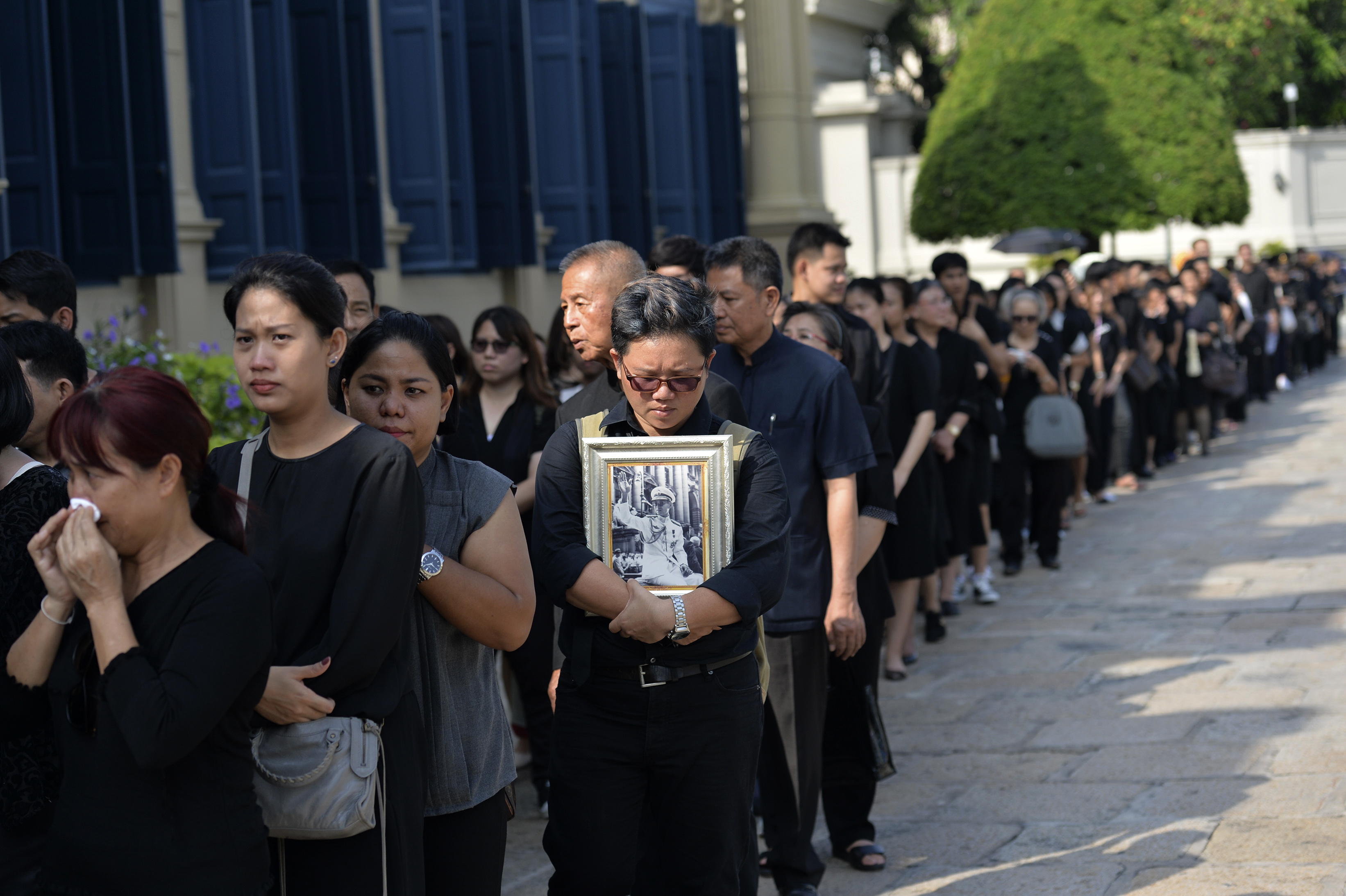
King Bhumibol Adulyadej, long a unifying figure in politically fractious Thailand, died on October 13 and uncertainty over the succession quickly arose as his crown prince reportedly sought a delay in taking over. / AFP PHOTO /
by Anusak KONGLANG / Thanaporn PROMYAMYAI
BANGKOK, Thailand (AFP) — Massive crowds of black-clad Thais lined Bangkok’s streets Friday hoping to see King Bhumibol Adulyadej’s body borne to his palace, as the nation grieved for a monarch whose passing leaves the country facing an uncertain future.
Bhumibol, the world’s longest-reigning monarch, passed away at 88 on Thursday after years of ill health, ending seven decades as a stabilising figure in a nation of deep political divisions.
Crown Prince Maha Vajiralongkorn, 64, is the king’s named successor but has made a surprise request to delay formally assuming the throne, according to Thailand’s junta leader, who appealed for citizens to “not cause chaos”.
A sea of reverent mourners, sprinkled with umbrellas against the harsh tropical sun, thronged sidewalks along the route of a royal motorcade that will bear the king from the hospital where he died to his glittering nearby palace complex.
Thousands of others, many holding his portrait, waited at the palace compound, shattered by the loss of the only king most have ever known and expressing anxiety for the future.
Some mourners at the hospital fainted in the heat and were carried away on stretchers, AFP journalists said.
Phongsri Chompoonuch, 77, clutched the late monarch’s portrait as she walked towards the palace.
“No matter how far it is, I can walk,” she said, her voice shaking and eyes glistening with tears.
Fear of the unknown
“We no longer have him. I don’t know whether I can accept that. I fear, because I don’t know what will come next,” she added.
At the palace, the crown prince was to preside over the bathing of the king’s body, a traditional Buddhist funeral rite.
Months of palace rituals were to follow, including at least 100 days of chanting by monks.
Thais had expected Vajiralongkorn to be officially proclaimed king immediately.
But military junta leader Prayut Chan-O-Cha late Thursday announced the prince had sought a delay to mourn and prepare for the crown.
Bhumibol was seen as a pillar of stability during his politically turbulent 70-year reign, and uncertainty for the future rests largely on doubts over whether his son can exert the same calming moral authority.
The crown prince spends much of his time overseas and does not command the reverence at home that his father did.
There was no indication of a threat to the crown prince’s eventual succession, however, and analysts said the pause could merely be out of respect for the deeply revered king.
Strict lese majeste laws muffle detailed discussion of the sensitive succession issue.
‘Element of ambiguity’
“We maybe shouldn’t read too much into (the delay),” said David Streckfuss, an expert on the Thai monarchy.
“But we have already departed from what should have been a normal succession process. An element of ambiguity has been injected into the situation.”
The junta overthrew the democratically elected government of Yingluck Shinawatra in 2014, saying it wanted to end a decade of political strife.
Yingluck’s brother, exiled tycoon Thaksin Shinawatra, had previously been ousted in a 2006 coup, and tensions have simmered between his throngs of supporters and a competing faction seen as aligned to the crown and military.
Some analysts believe the 2014 takeover was prompted in part by concerns over an unstable succession in which Thaksin’s faction could seek to exert influence.
Bhumibol’s reign saw decades of rapid economic development but also frequent military coups that set back democracy.
Although the king approved most of the army’s many successful coups, he also sometimes intervened to quell political violence, and his loss worries some Thais.
“Now I am afraid of what may happen, about the administration of the country, the type of regime in the long term,” said Arnon Sangwiman, a 54-year-old electricity company employee.
Government offices and state-run enterprises were closed out of respect Friday, but commercial activity otherwise carried on as usual.
Stocks, pressured all week as the king’s health worsened, rebounded Friday, with the benchmark index gaining 4.18 percent by midday.
Authorities continued to interrupt all television programming in the country — including international networks such as the BBC and CNN — using their signals to broadcast non-stop hagiographic fare on the king’s life.
But colour was restored, a day after all TV images were transmitted in black and white.
Praise for Bhumibol’s role as a ruler devoted to his subjects has poured in from across the globe including from US President Barack Obama and UN Secretary General Ban Ki-moon.
© 1994-2016 Agence France-Presse







